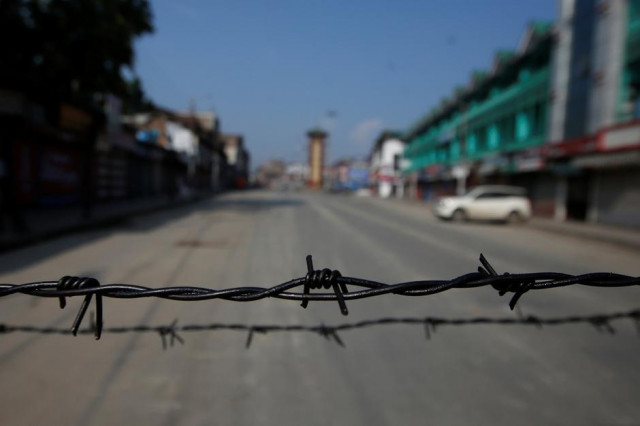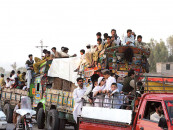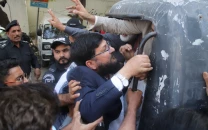Questions raised on delays in taking India to ICJ
Rights and law experts suggest Kashmiris take lessons from Palestinians

PHOTO: FILE
This was stated by speakers at a jurists’ session on “Kashmir: A story of lawlessness of legal and political institutions”. The session had been organised by Legal Forum for Oppressed Voices of Kashmir (LFOVK) – an Islamabad-based legal organization to define the problems faced by people living in Indian Occupied Jammu and Kashmir, to critically think and find the best possible legal plan of action to take the issue to international justice bodies.
Justice Ali Nawaz Chowhan, the chairman of the National Commission on Human Rights, urged Kashmiris take lessons from similarly oppressed and disenfranchised nationalities such as the Palestinians.
He said that Kashmiris can form a group so that they can be formally recognized. Once they do that, they can represent themselves before world bodies, such as the United Nations.
UNSC discusses situation in Indian Occupied Kashmir for a third time
Justice Chowhan, who has also been a tenured Judge at The Hague and served as the Chief Justice of Gambia, further said that UN Resolutions on Kashmir nurture the struggle of Kashmiris. But when it comes to the legal aspect of the dispute, he said that he failed to understand why Pakistan, as a state and important party to this dispute, has not approached the International Court of Justice (ICJ).
“It is a mystery,” he said, adding, “If Gambia can approach the ICJ on Myanmar, why can’t state of Pakistan take the case of Kashmir on gross human rights violations by India in occupied Kashmir?”
He stated that Pakistani authorities must explain the reason for this delay, adding that India is violating international humanitarian law, particularly Article 42 of Geneva conventions and other laws.
“One cannot find what we call as Ubi Jus Ibi Remedium (For every wrong, the law provides a remedy) because you cannot get a remedy at Indian courts,” he explained.
An emphasis was placed on the role of the UN and other international human rights organizations in the Kashmir case by other jurists present in conference including Association for the Rights of the People of Jammu and Kashmir Chairman Justice (retired) Syed Manzoor Gilani, Additional Attorney General of Pakistan Abid Raja, former president of the Supreme Court Bar Association and vice chairman of Pakistan Bar Council Kamran Murtaza, ASC Advocate Fasihuddin Vardag, Barrister Afzal Hussain Jaffri, former Azad Jammu Kashmir Assembly legislator Farzana Yaqoob, International Law Scholar Advocate Rafia Sailani, and LFOVK Research Associate Laiba Amjad.
‘Nation stands with people of Kashmir’
They said there is a need to mobilise world opinion and give the right direction to the Kashmir movement. They emphasised the need to engage the youth and media outlets to highlight the issue. Legal actions must be taken at the international level to expose the forces behind the whole conspiracy.
The speakers also referred to Indian army war criminals in Kashmir and to expose them globally.
At the conclusion of the session, LFOVK launched two legal research papers titled: “Kashmir a case of prolonged occupation” and “Kashmir Question: Islamic Law Perspective”.k



















COMMENTS
Comments are moderated and generally will be posted if they are on-topic and not abusive.
For more information, please see our Comments FAQ